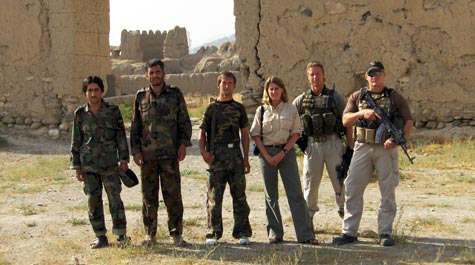When the Bombs Finally Stop, Reconstruction Begins
Christie Warren brings a lifetime of experience to the pioneering post-conflict justice program.
Nothing is immune from the ravages of war, including a nation's justice system. Once the ceasefire is signed and the soldiers return home, it's the enormous task of shell-shocked citizens with the help of a few international legal experts to help re-establish the Rule of Law.
William & Mary Law Professor Christie Warren has been working in this legal no-man's-land for the past 14 years, helping countries get back on their feet after devastating conflicts, civil wars and even genocide.
Recently, Warren was one of three U.S. legal consultants asked to advise the drafters of the Kosovo constitution. In April 2008 she flew to newly independent Kosovo as a guest of honor at the historic signing ceremony.
Warren is the founding director of the Law School's pioneering Program in Comparative Legal Studies and Post-Conflict Justice, where she serves as a one-woman link between struggling foreign governments, international legal organizations and dedicated W&M law students.
In Warren's seminar "Special Problems in Post-Conflict Justice," a small number of students work as long-distance law clerks for attorneys in countries such as Afghanistan, Argentina, Azerbaijan, Cambodia, China, Kosovo, Libya, Sudan and Zimbabwe. Warren believes that her seminar helps students appreciate the tremendously varied and important career paths that are available with a William & Mary law degree.
"This work is a wonderful lens for students and law professors alike to look through," says Warren. "A lens that asks us to move beyond focusing merely on salaries and prestige and think instead about how legal knowledge and skills can be used to better the world and solve some of the problems people everywhere are facing."
Students who take Warren's seminar are also able to take advantage of other international courses offered by the Law School, including international law, comparative constitutional law, international human rights law, Islamic law, international women's rights law, and law and the ethics of war. Many go on to complete summer internships in post-conflict regions where they experience the legal challenges of the re-building process first-hand.
Back on campus, these long-distance law clerks benefit from law librarians who are respected authorities in international research, plus ready access to expert W&M faculty at the Law School and throughout the university.
"Students brainstorm with each other, share creative research strategies, and problem-solve," says Warren. "The ability to link to a well-respected academic community and the resources available here has exponentially increased the information available to people working abroad in very difficult conditions."



